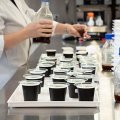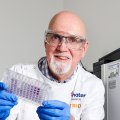Novel surface modification methods being developed by a University of Queensland researcher will overcome a final hurdle in the replacement of steel parts with lighter metals in next-generation, fuel-efficient cars, trucks, air- and space craft.
Dr Ming-xing Zhang, a Senior Lecturer with UQ’s Division of Materials within the School of Engineering, said to date, lighter alloys, magnesium alloys in particular, had been problematic for wider applications in the automotive and aeronautical industries because of their softness and poor corrosion resistance.
To help him with his important research, Dr Zhang has been awarded a $65,000 UQ Foundation Research Excellence Award.
“Lighter vehicles are cheaper to run as they consume far less fuel. For example, a 10 percent weight reduction of a car can save 0.7 litres of fuel every 100 km. However, the fact that these materials are not as wear-resistant as steel and the low corrosion resistance of magnesium alloys is greatly limiting their use,” Dr Zhang said.
“Australia has strategic long-term interests in the production, processing and application of light metals and has become a world leader in alloy development so it is vitally important we don’t lose any momentum in refining these products further.”
Dr Zhang’s laboratory is evolving and trialling different routes as well as two methods of treating the surface of light metals to vastly increase their strengths and corrosion property but not their weights or densities.
One of the methods involves the application of an ultra-fine powder “cold spray” to the alloy surface, a technique known as Kinetic Metallisation (KM).
Dr Zhang’s research group is one of a handful in the world racing to develop the methods which would open the floodgates to replacing the major parts currently made of steels in car, truck and even aeroplanes such as engines and wheels with lighter alloys.
Another group, involving Professor Ke Lu and Associate Professor Yinong Shi from the Institute of Metal Research in China, is collaborating with Dr Zhang on his research.
In mid-October this year, Dr Zhang’s laboratory will take delivery of a $320,000 KM-Coating Development System, which will greatly enhance the development of the novel surface modification techniques.
The equipment, partly funded by a UQ New Staff Start-up Grant and the Australian Research Council Centre of Excellence in Design of Light Metals, in which UQ is a core partner, is believed to be the only one in the Southern Hemisphere.
Dr Zhang, from Westlake, has been working at UQ since the completion of his PhD under the supervision of Associate Professor Patrick M Kelly.
He said he chose to study and work at UQ because it was a world leader in the area of light metals, it supported and encouraged early-career researchers and offered state-of-the-art research facilities.
“I am very happy and excited about winning the award and am very grateful to Dr Kelly and my colleagues at the Division of Materials for their help. It is wonderful to have your research recognised in this way,” he said.
The University of Queensland’s outstanding research achievements are being celebrated during Research Week 2006 from September 18 to 22.
The event is designed to raise awareness of current UQ research among the university community, the general public, industry, government and the media.
For details of this year’s program visit http://www.uq.edu.au/research-week/
Media inquiries: Dr Ming-xing Zhang (07 3346 8709) or Shirley Glaister at UQ Communications (07 3365 2049).




